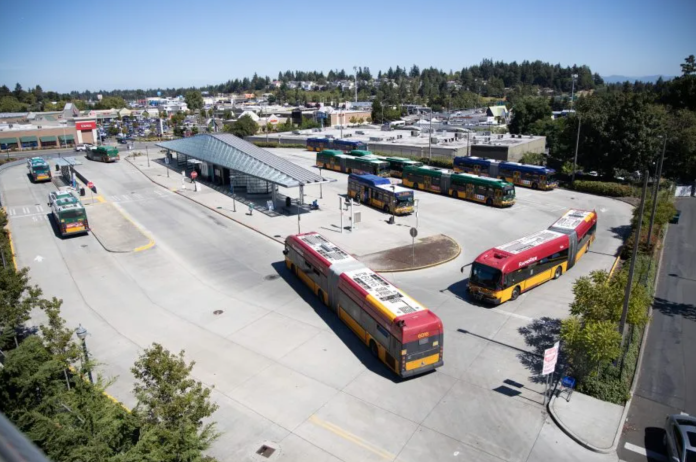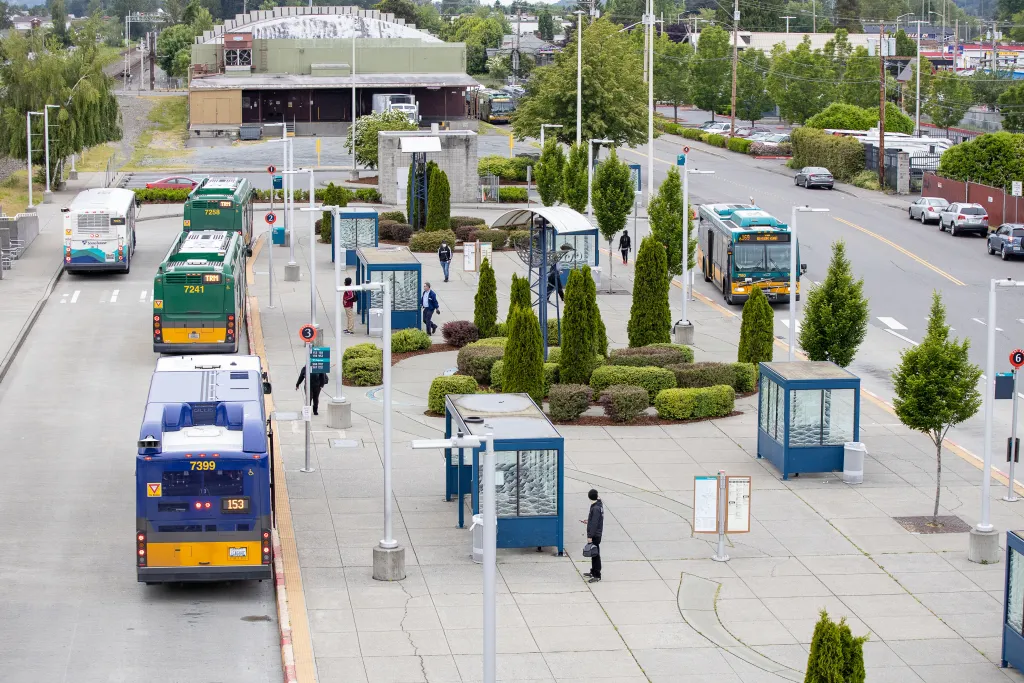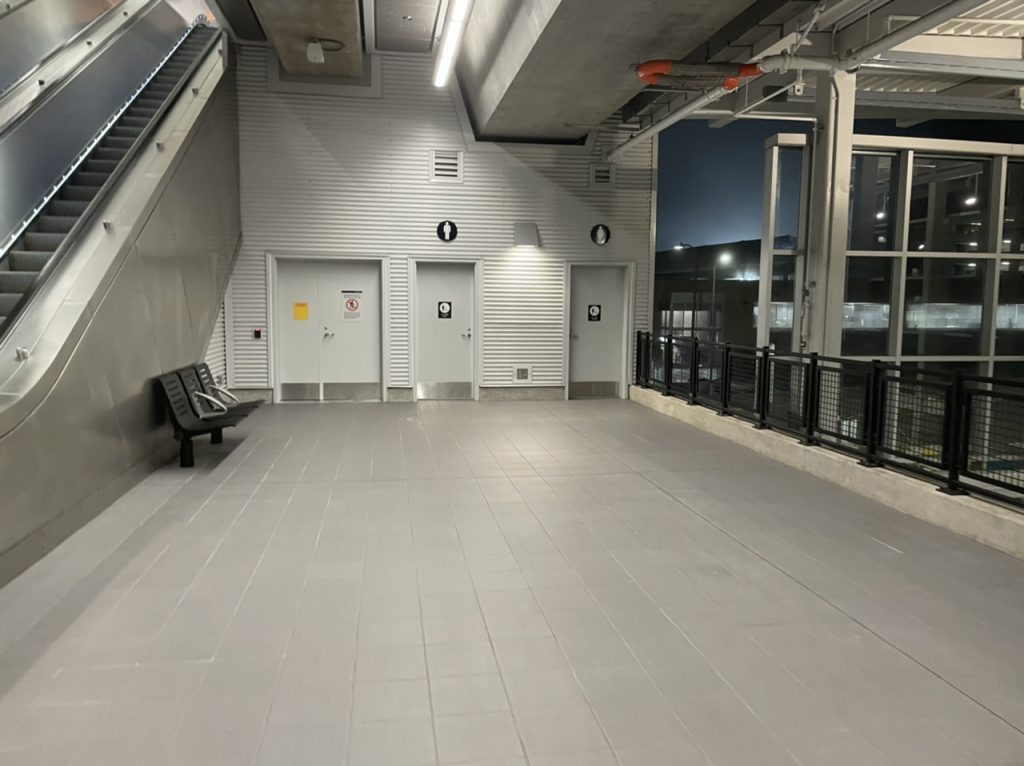
Two public restroom facilities at county-owned transit centers are set to close at the end of 2024, according to a report King County Metro provided to the County Council earlier this month. Metro operated the two sets of portable restrooms at Aurora Village and Burien Transit Centers as a pilot program for only a few months.
Despite initial data showing promising results and few security issues, King County Executive Dow Constantine does not appear eager to let the pilot continue or to find another pathway to expand restroom access, leaving the council to find a path forward.
Central Puget Sound has a dearth of public restrooms, particularly at transit facilities, with the few available often accessible for limited hours and many riders dependent on nearby private businesses for restroom access. The six-month pilot program was instigated by the County Council via a proviso in this year’s budget spearheadd by Councilmember Rod Dembowski. It had been intended to potentially pave the way for permanent facilities for riders.
However, the pilot program’s high costs, mostly associated with providing 24-hour security to both transit centers to monitor the restrooms, will likely prove the biggest deterrent to making them permanent.
The cost of operating the two restrooms for six months was $568,567, with nearly 70% of that cost going to security personnel, according to Metro’s report. That added security seemed to have a positive impact that was largely separate from the restroom pilot — during the four months additional security was in place, security incidents decreased 25% at Aurora Village and 13% at Burien, compared to the five months prior.
In determining the need to put security officers around the clock at porta-potties, Metro says it looked at best practices from around the country, pointing to the fact that the restrooms at both transit centers are accessible to anyone, not just transit riders.

Usage of the public restrooms, after only a few months of being in place, is not high: just 32 people using the facilities at Aurora Village and 19 at Burien Transit Center on an average day. But that’s not incredibly shocking, given the fact that Metro riders have long been trained to hold it and not expect to find public restrooms, even though other transit agencies in Puget Sound do offer publicly accessible restroom facilities. New habits and expectations may not be formed in just a few months’ time.
In justifying the need to sunset the program without additional direction from the council, county officials point to provisions in King County code that date to 1995 regarding the siting of public restrooms. That code disqualifies all of Metro’s transit centers from hosting public restrooms, but the final report doesn’t recommend making any changes to that code to allow transit riders to meet basic needs.
“Given King County Council interest in a public restroom at the two locations identified, Metro is currently planning to maintain operations at both locations through the end of 2024,” the report states. “At this juncture, given none of Metro transit centers meet multiple elements of the King County Code criteria, to continue would require further discussion with the King County Executive Office and King County Council to consider options and inform next steps regarding the provision of public restroom at the two pilot locations and possible modifications to King County Code.”
At a briefing Tuesday morning, several members of the County Council suggested they weren’t ready to throw in the towel on restrooms at Metro facilities.
“Anywhere else in the world: you got to go to the bathroom if you’re on a transit system, usually there’s a spot to do it; there’s just more public restrooms,” said Dembowski, who represents the district home to Aurora Village. “There’s a long history in Seattle with struggling with public restrooms, they can be costly, difficult to maintain, but I think for the usability of our system and the riders, I think it’s something we ought to continue to work on.”
Dembowski suggested that Metro may have taken things too far when deciding to hire around-the-clock security to monitor a public toilet at each transit center. “I just find it a little bit overkill to have a security officer in a parked truck looking at the porta-potty 24/7,” Dembowski said. “That’s, by the way, in addition to security that we’ve got elsewhere on the site.”
“Part of Metro’s rationale was that the code has a requirement that a restroom can only be provided when there is staffing available on site,” council policy analyst Mary Bourguignon told Dembowski in response. “It doesn’t specify that that needs to be security staff or regular staff, but Metro notes in the report that they wanted to comply, to the extent possible, with the code as written, and then, that there are national best practices.”

If the restroom pilot is to continue, or even expand, it will fall on the county council to find a way to fund it — but spending $1 million per year for two restrooms likely isn’t going to remain viable for long, either.
“The idea of having restrooms readily available at the locations where we provide these services is something we are just going to have to keep working on,” Councilmember Claudia Balducci said. “We know the need is there. The challenges have been difficult to surmount, but we need to keep working at it.”
Surmounting those issues may take getting other agencies involved.
“There is a need for us to figure out how to further the goals of having more restrooms available, but also recognize that perhaps this responsibility is not just to be shouldered by Metro,” Councilmember Teresa Mosqueda said. “I think that this gives us an opportunity to think about how the County, and local jurisdictions partner to provide the type of restroom facility and access that is needed, not just for riders, as was noted, but for all of us — housed and unhoused folks.”
At Kirkland Transit Center, a public restroom operated by the City of Kirkland is just a few steps from bus stops, though it is not open overnight. Metro notes in its report that continued operations at Aurora Village or Burien would likely require coordination with local governments. There are signs that those local governments might not be happy with the potential removal of restrooms, which would force people who use those facilities toward more unsanitary measures out of desperation.
At a meeting of the Burien City Council on Monday night, Burien Mayor Kevin Schilling brought up the topic during a separate conversation with Metro staff about transit-oriented development at Burien Transit Center. “If we could have a conversation about that, I think that would be a difficult decision to make, and I think that would not be very good for the population that takes Burien Transit Center,” Schilling said.
With the two restrooms set to remain open for a few months, we can expect the issue to present itself during the county council’s budget deliberations this fall.
“I’m going to continue to work to make sure that we have a public restroom at the Aurora Village Transit Center, and if we need to modify our standing policies, which are quite old, with lessons learned, and also to give some flexibility to Metro — I’m not sure that one size fits all in a county of 2.3 million,” Dembowski said. “I’m still committed to expanding our public restroom facilities on our system.”
Ryan Packer has been writing for The Urbanist since 2015, and currently reports full-time as Contributing Editor. Their beats are transportation, land use, public space, traffic safety, and obscure community meetings. Packer has also reported for other regional outlets including Capitol Hill Seattle, BikePortland, Seattle Met, and PubliCola. They live in the Capitol Hill neighborhood of Seattle.


